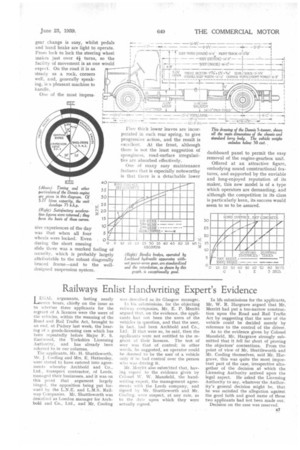Railways Enlist Handwriting Expert's Evidence
Page 41

If you've noticed an error in this article please click here to report it so we can fix it.
LEGAL arguments, lasting nearly seven hours, chiefly on the issue as to whether three applicants for the regrant of A licences were the users of the vehicles, within the meaning of the Road and Rail Traffic Act, brought to an end, at Pudsey last week, the hearing of a goods-licensing case which has been repeatedly before Major F. S. Eastwood, the Yorkshire Licensing Authority, and has already been referred to in our columns.
The applicants, Mr. H. Shuttleworth, Mr. J. Cooling and Mrs. E. Hattersley, were stated to have entered into agreements whereby Archbold and Co., Ltd., transport contractor, of Leeds, managed their businesses, and it was on this point that argument largely hinged. the opposition being put forward hv the L.N.E. and L.M.S. Railway Companies. Mr. Shuttlewcirth was described as London manager for Archbold and Co., Ltd., and Mr. Cooling was described as its Glasgow manager.
[is his submissioits, for the objecting railway companies, Mr. E. P. Merritt argued that, on the evidence, the applicants had not been the users of the vehicles in question, and that the user, in fact, had been Archbold and Co., Ltd. If that were so, he said, then the applicants were not entitled to the regrant of their licences. The test of user was that of control; in other words, lie suggested, an operator could be deemed to be the user of a vehicle only it he had control over the person who was driving it.
Mr. Merritt also subm!tted that, having regard to the evidence given by Colonel W. W. Mansfield, the handwriting expert, the management agreements with the Leeds company, and signed by Mr. Shuttleworth and Mr. Cooling. were suspect, at any rate, as to the date upon which they were actually signed. In his submissions for the applicants, Mr. W. R. Hargrave argued that Mr. Merritt had put a too-narrow construction upon the Road and Rail Traffic Act by suggesting that the user of the vehicle could be decided merely by reference to the control of the driver, As to the evidence given by Colonel Mansfield, Mr. Hargrave strongly submitted that it fell far short of proving the objectors' contentions. From the point of view of Mr. Shuttleworth and Mr. Cooling themselves, said Mr. Hargrave, this was quite the most important part of the case, irrespective altogether of the decision at which the Licensing Authority arrived upon the legal aspect. He asked the Licensing Authority to say, whatever the Authority's general decision might be, that he was satisfied the allegation against the good faith and good name of these two applicants had not been made out.
Decision on the case was reserved.












































































